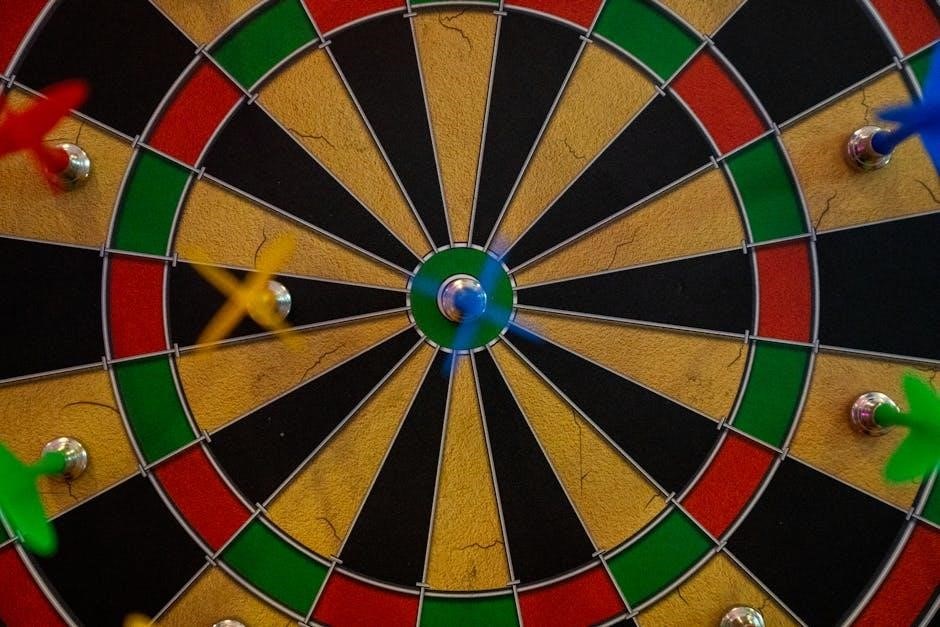Game Manual 2 provides a detailed guide to the FTC Center Stage game, covering gameplay rules, autonomous and driver-controlled periods, field setup, competition structure, and essential resources for teams to prepare effectively.
Overview of the FTC Center Stage Game
The FTC Center Stage game is a dynamic and strategic competition where alliances of two teams collaborate to achieve objectives within a fast-paced environment. The game features two primary periods: the Autonomous Period, where robots operate independently using pre-programmed instructions, and the Driver-Controlled Period, where teams manually control their robots to score points. Key elements include Randomization Objects, which add variability to each match, and a scoring system that rewards precision and teamwork. Teams must navigate the field, interact with game elements, and optimize their strategies to maximize points. The game emphasizes innovation, collaboration, and adaptability, making it both challenging and rewarding for participants. By understanding the rules and mechanics outlined in Game Manual 2, teams can better prepare for competition and enhance their performance on the field.
Purpose of Game Manual 2
The purpose of FTC Center Stage Game Manual 2 is to provide teams with a clear and comprehensive understanding of the game’s rules, mechanics, and strategic elements. This manual serves as an essential resource for teams to prepare for competition, offering detailed insights into gameplay procedures, scoring systems, and field setup. It outlines the specific rules for the Autonomous and Driver-Controlled periods, as well as endgame procedures and point allocation, ensuring teams can develop effective strategies. Additionally, Game Manual 2 highlights key updates and changes from previous versions, ensuring compliance with the latest regulations. By adhering to the guidelines and information provided in this manual, teams can optimize their performance, understand the competition structure, and make informed decisions during matches. This document is a critical tool for achieving success in the FTC Center Stage game, complementing the foundational information provided in Game Manual 1.
Key Updates and Changes in Game Manual 2
Game Manual 2 for FTC Center Stage includes several key updates and changes to enhance gameplay and clarity. One major update involves the autonomous period rules, with new scoring achievements and adjustments to robot behavior during this phase. Additionally, the driver-controlled period rules have been refined, incorporating changes to game element interactions and team strategies. The endgame procedures have also been clarified to ensure consistency and fairness in match conclusions. Scoring adjustments have been made to reflect changes in point allocation for specific actions, providing teams with updated strategies to maximize their scores. Furthermore, the manual introduces new resources, such as audio versions and quizzes, to help teams better understand the rules. These updates ensure that the game remains dynamic and competitive while maintaining a balanced and transparent structure for all participants.

Gameplay Rules and Mechanics
Gameplay rules and mechanics in FTC Center Stage focus on autonomous and driver-controlled periods, with specific scoring systems and interactions with game elements, ensuring strategic and dynamic competition.
Autonomous Period Rules
The Autonomous Period in FTC Center Stage lasts 30 seconds, during which robots operate independently using pre-programmed instructions. Teams earn points by completing tasks such as scoring objects or interacting with field elements. No human intervention is allowed, emphasizing robot accuracy and programming precision. Rules ensure fair competition, with penalties for violations like exceeding time limits or unauthorized actions. Teams must adhere to these guidelines to maximize their scores and maintain compliance with game standards.
Driver-Controlled Period Rules
The Driver-Controlled Period in FTC Center Stage lasts 90 seconds, allowing teams to manually operate their robots to score points. During this phase, two alliance teams work together to achieve objectives by moving game elements into target zones. Drivers must operate within the field boundaries, and any intentional blocking or damaging of opponents’ robots results in penalties. Teams earn points based on the placement and quantity of objects scored. A human player may assist by loading items into the robot, but only from designated areas. Strategic coordination between alliance partners is crucial to maximize scoring efficiency. Violations, such as exceeding time limits or unsafe operations, can lead to deductions or disqualification. This period emphasizes teamwork, precision, and adaptability under pressure, as teams aim to outperform their opponents while adhering to the rules.

Endgame Procedures and Scoring
The endgame procedures in FTC Center Stage involve final scoring and robot positioning. At the conclusion of the Driver-Controlled Period, robots must be parked in designated zones to earn bonus points. Each alliance’s score is calculated by summing points from autonomous and driver-controlled actions, as well as endgame achievements. Robots successfully parked in elevated zones or balanced on platforms receive additional points. If a robot is not fully within the field or touching the mat at the end of the match, it may incur penalties. Points are awarded based on the difficulty of the parking position and the number of robots that achieve it. Teams must ensure compliance with all rules to avoid deductions. The endgame emphasizes precision and strategic placement, as these final actions can significantly impact the overall match outcome.

Scoring System and Point Allocation
The FTC Center Stage game employs a structured scoring system where points are earned through specific actions during the Autonomous and Driver-Controlled periods. Points are allocated based on the completion of tasks such as scoring cargo, interacting with game elements, and achieving endgame objectives. During the Autonomous Period, robots earn points for executing pre-programmed actions, such as delivering cargo to designated zones or engaging with randomization objects. In the Driver-Controlled Period, teams score points by navigating the field, manipulating game elements, and completing alliance-based strategies; Bonus points are awarded for endgame achievements like parking in elevated zones or balancing on platforms. Penalties, such as illegal moves or interference, result in point deductions. The scoring system emphasizes precision, teamwork, and strategic execution, with points accumulated across both periods determining the final match outcome. Understanding the point allocation is crucial for teams to maximize their score and gain a competitive edge.

Field Setup and Game Elements
The FTC Center Stage field features a structured layout with specific dimensions and randomization objects. Two randomization objects are placed on center spike marks, playing crucial roles in scoring and gameplay dynamics. Dimensions and setups are detailed on AndyMark’s FTC website for precise construction and competition preparation.
Field Layout and Dimensions
The FTC Center Stage field is a 12 feet by 12 feet square mat, designed to accommodate dynamic gameplay. The layout includes alliance stations positioned at each corner, with specific zones for robot deployment and interaction. Two randomization objects are placed on center spike marks, influencing scoring opportunities. The field’s dimensions and setup ensure balanced gameplay, with detailed measurements available on AndyMark’s FTC website for precise construction and competition preparation. Teams must adhere to these specifications to ensure compliance with official game rules and regulations.
Randomization Objects and Their Roles
The FTC Center Stage game features two Randomization Objects, placed on the center spike marks, designed to introduce unpredictability and challenge. These objects play a crucial role in the Autonomous Period, as their positions determine potential scoring opportunities. Teams must design their robots to adapt to these randomized elements, testing their vision systems and programming skills; The objects’ placement requires strategic planning to maximize points during the match. Their roles emphasize adaptability and precision, ensuring dynamic gameplay and fair competition. Detailed specifications and rules governing these objects are outlined in Game Manual 2, ensuring all teams understand their integration into the game’s mechanics. These elements are essential for achieving success in the FTC Center Stage competition.
Alliance Stations and Team Setup
In FTC Center Stage, teams compete in alliances, with each match featuring four teams divided into two alliances. Alliance stations are strategically positioned on the field to facilitate gameplay and teamwork. Each team consists of up to two driver operators, a human player, a coach, and a robot. The human player interacts with game elements, while drivers control the robot during the Driver-Controlled Period. Alliance stations are designed to ensure clear communication and coordination among team members. Teams are paired randomly or strategically based on rankings, fostering collaboration and adaptability. Proper setup and organization of alliance stations are crucial for smooth match operations. This structure promotes fair competition and requires teams to work cohesively to achieve shared objectives.

Competition Format and Structure
The competition features matches of 2.5 minutes, including autonomous and driver-controlled periods. Teams compete in alliances of two, with rankings based on performance. Advancement is determined by win-loss records and tiebreaker points.
Match Structure and Timing
A match in FTC Center Stage lasts 2 minutes and 30 seconds, divided into three key periods: Autonomous, Driver-Controlled, and Endgame. The Autonomous Period begins first, lasting 30 seconds, during which robots operate independently based on pre-programmed instructions. This is followed by the Driver-Controlled Period, which lasts 2 minutes, where human operators control the robots to score points. The final 30 seconds of the match are dedicated to the Endgame, where specific scoring actions can be completed to maximize points. Teams must ensure their robots are fully functional and comply with all rules during these periods. The match structure is designed to test both autonomous programming skills and strategic human operation; Teams are given a limited time before the match to inspect the field and prepare. After the match concludes, there is a brief review period to assess any penalties or disputes before finalizing the score.
Alliance System and Team Pairings
The FTC Center Stage game employs an alliance system where each match features four teams, divided into two alliances, each consisting of two teams. Alliances earn points collectively, with each team contributing to the total score based on their performance. The pairing of teams into alliances is typically random, though in higher levels of competition, alliance captains may have some discretion in selecting their partners. To maintain fairness, the system incorporates mechanisms to balance alliance strengths, ensuring that no single alliance holds a significant advantage. This balanced approach fosters collaboration and strategy among teams, encouraging them to work together seamlessly to achieve the highest possible score. The alliance system is a cornerstone of FTC competitions, promoting both individual robot performance and effective teamwork, all within the structured framework of the game.
Advancement Criteria and Rankings
Advancement in FTC competitions is determined by a combination of ranking points, awards, and specific criteria outlined in Game Manual 2. Teams earn ranking points based on their performance in matches, with higher scores contributing to better rankings. Rankings are typically determined by combining autonomous and driver-controlled period scores, as well as endgame procedures. Winning alliances and individual robot achievements also play a role in advancing to higher levels of competition. Additionally, judged awards for design, innovation, and teamwork can influence advancement. The criteria for advancement may vary by region and tournament level, but the core focus remains on robot performance, strategy, and collaboration. Teams are advised to review Game Manual Part 1 for detailed information on ranking systems and tie-breaker rules. Understanding these criteria is essential for teams to strategize effectively and aim for advancement in the FTC Center Stage competition.
Penalties and Disqualification Rules
Penalties and disqualifications in FTC Center Stage are enforced to ensure fair play and adherence to game rules. Penalties may be imposed for actions such as unsportsmanlike conduct, robot malfunctions, or violations of game rules. Disqualifications are typically reserved for severe or repeated offenses, such as intentional rule breaches or external interference with the game. Teams may also face penalties for illegal robot modifications or failure to comply with field setup requirements. A warning system is often used before applying penalties, allowing teams to correct issues. Disqualifications result in the team being removed from the match or competition, impacting their rankings and advancement opportunities. Detailed penalty codes and disqualification criteria are outlined in Game Manual 2 to ensure clarity and consistency. Teams are encouraged to review these rules thoroughly to avoid penalties and maintain a competitive edge in the FTC Center Stage competition.

Resources for Teams

Resources include audio versions of Game Manual 2 for accessibility, a comprehensive quiz to test knowledge, and translated manuals for global teams. Visit the official FTC website for additional tools and support.
Audio Versions of Game Manual 2
The FTC Center Stage Game Manual 2 is available in audio format, designed to enhance accessibility for teams. These recordings cover the entirety of Section 4.0 and provide a detailed overview of the game rules, updates, and strategies. The audio versions are particularly useful for teams with members who have visual impairments or prefer auditory learning. They are created by dedicated teams who volunteered to ensure all participants can engage with the manual fully. The recordings are approximately 1.25 hours long and include bonus content from Game Manual 1 for a comprehensive understanding. Audio versions are available for download on the official FTC website and are compatible with assistive devices. This resource ensures inclusivity and equal access to critical game information, helping teams prepare effectively for competition.
Game Manual Quiz for Teams

A Game Manual Quiz has been developed to help teams test their understanding of both Part 1 and Part 2 of the FTC Center Stage Game Manual. This quiz includes a mix of questions, with some specific to regional requirements and others focusing on general game rules and strategies. It is designed to ensure teams are well-prepared for competition by identifying key areas of knowledge. The quiz is available online and can be accessed through the FTC website or affiliated resources. Teams are encouraged to use this tool to reinforce their grasp of the game manual and to identify areas that may need further review. While primarily focused on gameplay rules, the quiz also touches on robot construction guidelines and competition procedures. This resource is part of FTC’s commitment to providing accessible and engaging educational materials for all participants.
Translated Versions of Game Manuals
Translated versions of the FTC Center Stage Game Manual 2 are available to support teams from diverse linguistic backgrounds. These translations aim to ensure accessibility and understanding for participants worldwide. Currently, versions in languages such as Spanish, French, and Chinese have been provided, with more translations in progress. Teams can access these translated manuals through the official FTC website or by contacting regional support. While the translations are designed to assist with comprehension, the English version remains the official source for competition rules and procedures. Additionally, text-based English versions are available for use with assistive devices, though redistribution is restricted. These resources reflect FTC’s commitment to inclusivity and ensuring all teams can engage effectively with the game manual’s content. For specific translation requests or accessibility needs, teams are encouraged to reach out to FTC support directly.

FTC’s Role and Consumer Protection
The FTC protects consumers by enforcing laws against deceptive practices and promoting fair competition. It ensures marketplace fairness, addressing fraud and anticompetitive behaviors to safeguard consumer interests and maintain a free market economy effectively.
FTC’s Mission and Objectives
The Federal Trade Commission (FTC) is a bipartisan federal agency dedicated to protecting American consumers and promoting a competitive marketplace. Its primary mission is to prevent deceptive, unfair, and fraudulent business practices while enforcing antitrust laws to ensure fair competition. The FTC achieves this by investigating violations, filing lawsuits, and creating guidelines for businesses to follow. Additionally, the agency educates consumers about their rights and how to avoid scams through various resources and initiatives. The FTC also maintains a Legal Library, providing access to legal documents, case studies, and policy statements to support transparency and public understanding. By addressing anticompetitive behaviors and protecting consumer interests, the FTC fosters an environment where businesses can thrive and consumers can trust the marketplace. This dual focus on consumer protection and competition enforcement underscores the FTC’s essential role in maintaining a fair and just economic system. Its objectives are clear: safeguarding consumers, promoting competition, and upholding the integrity of the free market.
Enforcement of Consumer Protection Laws
The FTC rigorously enforces consumer protection laws to prevent fraudulent, deceptive, and unfair business practices. Through investigations and legal actions, the agency holds companies accountable for misleading advertising, data privacy violations, and other harmful activities. The FTC also monitors compliance with regulations, ensuring businesses adhere to rules designed to protect consumers. Additionally, the FTC educates consumers about scams and deceptive practices, empowering them to make informed decisions. By addressing anticompetitive behaviors and safeguarding consumer rights, the FTC plays a pivotal role in maintaining a fair marketplace. Its enforcement efforts are supported by a comprehensive legal framework and a commitment to transparency, ensuring that consumers are protected and businesses operate ethically. Through these measures, the FTC upholds its mission to create a competitive and consumer-friendly environment. Regular updates to its enforcement strategies ensure the agency remains effective in addressing emerging threats and evolving market practices.
Legal Library and Resources
The FTC’s Legal Library is a comprehensive, searchable database containing a wide range of legal documents and resources. It includes cases, policy statements, guidance, and enforcement actions related to consumer protection and antitrust law. Teams and individuals can access detailed information on rulemaking, public statements, and legal interpretations, providing valuable insights into regulatory frameworks. Additionally, the FTC offers resources such as quizzes and translated game manuals to assist teams in understanding the rules and preparing for competitions. These resources are designed to promote compliance and fairness, ensuring a level playing field for all participants. By leveraging these tools, teams can gain a deeper understanding of the legal and operational aspects of the FTC Center Stage game. The FTC also provides updates on enforcement actions and rule changes, helping teams stay informed and adapt to new requirements. These resources underscore the FTC’s commitment to transparency and education in fostering a competitive and ethical environment.
The FTC Center Stage Game Manual 2 serves as an essential resource for teams participating in the competition, offering detailed insights into gameplay rules, field setup, and strategic approaches. By adhering to the guidelines and updates outlined in this manual, teams can ensure compliance and maximize their performance. The FTC’s commitment to fostering innovation and fair competition is evident throughout the document, with a focus on providing equal opportunities for all participants. Teams are encouraged to utilize the provided resources, including audio versions and translated manuals, to enhance their understanding and preparation. The FTC’s mission to protect consumers and promote ethical practices extends beyond the competition, inspiring teams to embody these values in their robotics journey. With this manual, teams are equipped to navigate the challenges of the FTC Center Stage game confidently and effectively, ensuring a rewarding and competitive experience for all involved.
